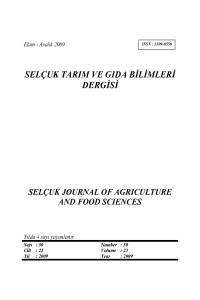Abstract
This work was carried out to determine the effects tree herbicides (Trifluraline, 2,4–D and Knock Out) on the micro-biological nitrification in two soil samples. The soil samples were collected from the agricultural lands of Bahri Dağdaş Experimental Station and Selçuk University Campus, Konya, and they were silty clay and sandy – clay loam in the tex-ture, respectively. The herbicides were applied to the soil samples at five different levels (0 – 200 – 600 – 1200 – 4800 mlda-1) and at six different incubation periods (0 – 4 – 8 – 12 – 20 – 40 days). The results can be summarized as follows; It was found that the most effective herbicides, to increase the microbio-logical nitrification, were Knock Out and Trifluraline at the levels of 4800 mlda-1 in Bahri Dağdaş silty clay, and 200 mlda-1 in the Campus sandy clay loam soil samples, respectively. It was concluded that, the herbicides showed a general tendency to increase nitrification of the soil samples.
Abstract
Laboratuvar koşulları altında yürütülen bu çalışma, Konya ovasındaki bazı yabancı otlara karşı yaygın biçimde kullanılan herbisitlerden Trifluralin, 2,4-D ve Knock Out’un iki farklı tekstüre sahip olan biri Bahri Dağdaş Kışlık Hububat Üretim ve Araştırma Merkezi arazisi, diğeri ise Selçuk Üniversitesi (S. Ü.) Kampüsü Ziraat Fakültesi deneme alanından alınan toprak örneklerine beş farklı dozda (0-200-600-1200-4800 ml/da) uygulanarak söz konusu toprakların mikrobiyal nitrifikasyon değerlerindeki değişmelerin 0., 4., 8., 12., 20. ve 40. günlerde ölçülerek belirlenmesi amacıyla yapılmıştır. Araştırma sonucunda, Bahri Dağdaş siltli kiline ait nitrifikasyonun Knock Out’un 4800 ml/da dozunda, Kampüs kumlu killi tınındaki nitrifikasyonun ise 2,4-D ve Trifluralin’in 200 ml/da dozunda daha fazla artış gösterdiği belirlenmiştir.
Details
| Primary Language | English |
|---|---|
| Subjects | Soil Sciences and Ecology |
| Journal Section | Research Article |
| Authors | |
| Publication Date | December 25, 2009 |
| Submission Date | January 1, 2009 |
| Published in Issue | Year 2009 Volume: 23 Issue: 50 |
Selcuk Agricultural and Food Sciences is licensed under a Creative Commons Attribution-NonCommercial 4.0 International License (CC BY NC).


